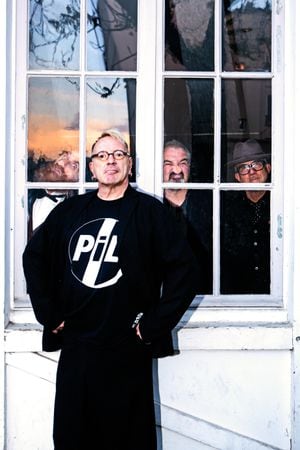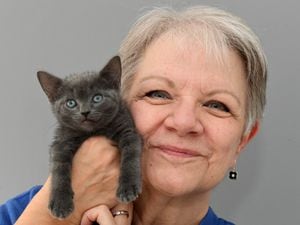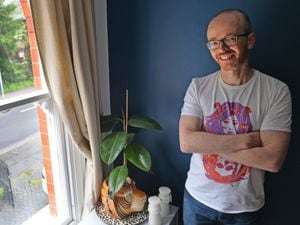John Lydon: Still an anarchist? I always will be . . .
There’s only one John Lydon – and he makes no apologies for that. Here he talks to Weekend about a life of ripping up the rule book. . .

He starts with a funny voice. Then he has a bit of a ding-dong with his beloved wife, Nora, which is hilarious. Faux outrage. Indifference. Brilliant. And then John Lydon warms-up for the inquisition by impersonating my Black Country brogue, elongating punkish vowels so that Wolverhampton sounds like Wulverammptun. He’s good. Very good.
“I’ve been expecting you,” says John Lydon, with the voice of a rotter.
“I was just being difficult.”
Being difficult is a pastime for which John deserves a Professorship. Watch YouTube interviewers with other writers and he tears them to shreds, eviscerating the meek and mild like one of the great white sharks that he used to dive with back in the day. But he doesn’t do that with us. Not once. He’s funny and rambunctious. Outspoken and sensational. We laugh our way through most of the conversation, paying for breath, occasionally allowing time for another question so that John can riff his way merrily through the next five minutes.
We ignore the rules about how long the interview should take, running on and on and on. And John’s never less than brilliant. His wit sparkles like a diamond in the rough. There is truth, truth and more truth. Bulls**t is conspicuous by its absence. He says it as it is. And those who are offended can go to Hell. In a burning handbasket.
But first, we need the promo. John’s talking to us to mark the 40th anniversary of his seminal band Public Image Ltd. They’re on the road from the end of May. The closest date for our Express & Star-reading bretheren is Coventry’s Copper Rooms on June 4, the best option for the Shropshire Star posse is Wrexham’s William Aston Hall on June 24. You should go. Every one of you. PiL are one of Britain’s great live bands. And John – the one-time snarling, sneering Johnny Rotten of The Sex Pistols – is a frontman whose on-stage brilliance puts him alongside such rock icons as Elvis and Mick Jagger. He’s one of the most important performances of the past 50 years. So go.
We start by congratulating him on PiL’s anniversary and ask him what he’s learned during a lifetime of brilliant rebellion.
“That persistence pays off,” and we both laugh aloud.
“Never take no for an answer and believe in what you do. Sooner or later there’ll be enough people who’ll listen. Truth has always been my weapon. Never lies. The only thing people come back to is truth.”
John’s life was shaped in the crucible of childhood. Born in London in 1956, his parents were working class migrants from Ireland who lived near to Arsenal’s ground. John was shy and retiring. His mother was regularly ill while his father worked all hours, so John became the de facto head of the family, looking after his three younger brothers. At the age of seven, he developed spinal meningitis after drinking rat-infested water from his yard. It changed his life. He suffered from hallucinations, nausea, headaches, periods of coma and a severe memory loss that lasted for four years
“When you lose your memory when you’re young you want everything to be a permanent reminder. So for me, I’m firmly grounded in reality because my childhood was stolen from me. I never want to experience that again. And I’m a happy boy because of it.”
He was kicked out of school at 15, when his workaholic father told him to cut his hair he instead dyed it green and pretty soon he was on the scene of London nightclubs with the likes of Sid Vicious and Jah Wobble, among others. By 1975, he was hanging around SEX, the fetish clothing shop launched by Malcolm McLaren and Vivienne Westwood. And soon Malcolm was encouraging him to join forces with a new band he was looking after, featuring Steve Jones, Glen Matlock and Paul Cook. They were called The Sex Pistols. John’s audition was a tuneless rendition of Alice Cooper’s I’m Eighteen. He got the gig and the rest, as they say, is history. Glen was deemed to be too middle-class and so he was replaced with his school friend, Sid Vicious, an incompetent bassist with an unending sneer.
“How can you mould and adapt to something like the record industry that I found so loathsome and deceitful? The answer is, you don’t. You end up being a person like me that’s called ‘difficult to work with’. But I take those things with a badge of pride. Who said I had to roll over to let my tummy be tickled? Life is a series of happy coincides. You have to have your mind open to be able to see what you can do. I feel sorry for the dumb. Because dumb don’t get you nowhere. In this industry, forewarned is forearmed. We did it without a single bit of violence. Words are my bullets and they worked.”
When their Great Rock’n’Roll Swindle ran aground, John started PiL. It was 1978 and by then he’d been the brains behind the most important British band since The Beatles, a group who forever changed the landscape. And while PiL could never hope to have the cultural impact of the Pistols, their output is truly sublime. It charted new territory, a victory of experimental pop and outright contrarianism. He did it his way, ignoring the nonsense of record companies and tearing up the rulebook. These days, his band have their own label – so that they don’t have to answer to any of the gooks.
“Record labels, they’re no friends of mine. I’m just here to have a laugh. Sometimes you can intermingle with out and out crooks as much as everyone else. So long as you know they can’t slip one past you, it’s fine. I could be friends with the devil and not have a problem. What I don’t take to is dictatorship and people demanding I do things their way. I can’t follow politics or political bands because rules are dictatorship. You can know what you can do with your rules, they’re not based on commonsense.”
He views PiL with nothing but love. It has been a remarkable opportunity. “The Pistols first gave me the opportunity to express all the things that were driving me insane. I had no release and no one to listen to me and then this came along. I know how lucky I am.
“Before PiL, I had the ideas, the values. Then I bumped into a platform to express them and here it is. I’ve never gone for the money. I don’t do this thing out of self-aggrandisement. I do it out of respect for the opportunity I have. The crowd know that.
“It’s nice that the band has influenced others. It’s fine to have influences but never copy. That’s a crime. A few outfits out there just copy everyone’s ideas and take the credit for them. That p**sed me off. I love originality, me. For me, I love originality.”
The beauty of John is his happy duality. He was the sneering anarchist who targeted the Queen but then took the shilling of a butter company asking him to advertise Country Life. He has been involved in bigger scandals than Profumo but proved himself to be utterly personable and empathetic when he featured on I’m A Celebrity. He adores the life and work of Oscar Wilde and rather than seeking anarchy – ‘mind games for the middle-classes’ – he describes himself as a pacifist in tune with Mahatma Gandhi. And don’t get him started on Jimmy Savile. John was blowing the whistle on the disgraced child abuser back in 1978, outing his paedophilic behaviour in defiance of libel risks and long before the story broke in 2012.
John laughs at those dichotomies. “If a butter company offers me a wodge, I’m having it. Mother Lydon didn’t raise foolish children. That was the most anarchic thing that’s ever come my way. What were they saying? I’m fat, grow some butter? I was in financial dire at the time and couldn’t get PiL out of the financial hole that the record company had us in. It was a gift from the gods. Don’t look the gifthorse in the mouth. And sales of butter went up by 85 per cent because of it. So I even helped the farmers.”
The one compromise he won’t make is his art. Songwriting, for him, is sacrosanct. His artform is true. “The cultural obligation is genuine in me. I didn’t create this horrible world where we need money.”
When he’s not on the road, he spends his time lounging around, doing nothing and turning into a blob. “It’s great. I need it. The batteries need a recharge.” And then he flicks a switch and goes into work-mode. Being John Lydon is hard. Being on the road is physical and mentally draining. “But I’m addicted to the agony of it.
“That’s something my father put In us when he was young. One job wouldn’t be enough. He’d be in bed at 10pm and up at 4am to do anything and everything he could all the time. Work never hurt anyone. As a child, I’d disagree. But I turned into my dad, in that sense. “Work keeps you healthy. It keeps you away from self-pity. When you have too much spare time bad things happen. My mum was the opposite. She was completely lazy. She’d let the dust pile up.”
Whatever mode he’s in – work or relaxation – one thing remains constant; an unending and incessant squall of noise in his mind. “The mind doesn’t’ stop ticking and that’s that. I’m not one for chemical outs on that. If I was attracted to chemicals, it would be the ones that would make me work even more.
“I’m attracted to activity. There are times when physically and mentally you can’t do anything. After a tour, I give so much that I collapse in on myself. But that’s the reward. You know you’ve worked to the nth degree.”
As well as being a brilliant songwriter and collaborator, John is also an exceptional writer. His first autobiographical volume was Rotten: No Irish, No Blacks, No Dogs. Published in 1993, it was a firecracker volume named as being one of the 25 best rock memoirs by Rolling Stone magazine. It chronicled the Pistols years and allowed John to condemn Malcolm McLaren, hippies, rich people, racists, sexists and the English political system. His pithy views on the Pistols were richly observed: “A lot of people feel the Sex Pistols were just negative. I agree, and what the f**k is wrong with that? Sometimes the absolute most positive thing you can be in a boring society is completely negative.”
The sequel, 2014’s brilliant Anger Is An Energy, was equally remarkable. He wanted to open up about the secrets of his life. “The books are all the same. One was the opening. Two was I’ve cracked it.”
He knows more than most about the power of music though realises its lost some potency. “I don’t know if it’s right to expect bands to change society. I think that’s too much to put on anybody. Society has to be prepared to change itself. At the moment, we’re led by shopping mall culture and product. That’s very destructive. For all the rebellion that hip hop offered, it comes down to Nike sneakers at the end of the day and that’s not a fast forward thing. We’re victims of commerce, myself included. Every now and then I like the look of a new pair of Nikes.”
We talk some more and as we start to wind down he offers homespun homilies before, improbably, we reach children’s nursery rhymes. The man who once spat: “I am an anti-Christ, I am an anarchist . . . Destroy,” starts reciting The Wheels on the Bus.
“The wheels on the bus go round and round . . .” There’s a point to it all, of course. “That’s the way life is. I mean that, it’s just like the nursery rhyme. If we just approached life in a more childlike way, we might be a bit happier.”
I thank Lydon for the interview, our fourth together, and for making me laugh so riotously. He genuflects. “That was a good interview. You got your questions spot on. You’re good. You knew where you were going.”
And then he ends it in his own inimitable style, offering a signature sign-off. “May the road rise, your enemies always be behind you, may they scatter, flatter, batter and shatter!”
He is truly original.





